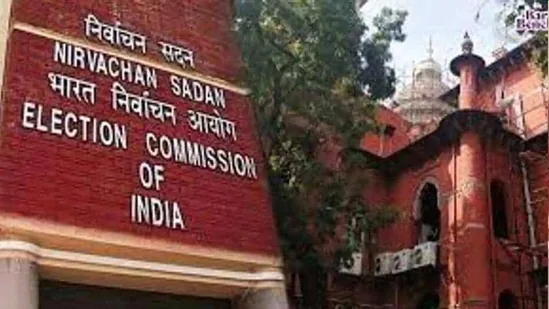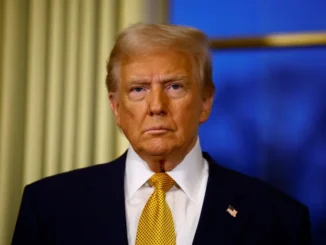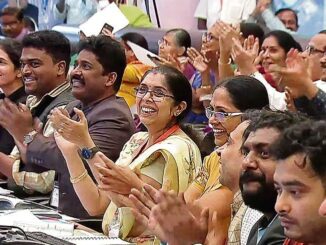
E.C. has not taken any action on the complaints against the Prime Minister even after a month for violating the moral code by explicitly attacking a minority community in his campaign speeches.
“The Indian Constitution Article 324 establishes an independent election commission; Article 327 empowers Parliament to enact laws governing all aspects of elections. Article 329 provides a mechanism for resolving electoral disputes through review by an independent judiciary. These articles reflect the clear preference of the constituent assembly to ensure the autonomy and independence of the ECI, protecting it from Executive interference (Devi and Mendiratta, 2000). ECI has been considered one of the most trusted public institutions in India that ensured integrity and conducted 17 national and 370 state elections since India’s independence in one of the most populous countries in the world.”

Ever since the BJP/RSS came to power with Narendra Modi at its helm, institutions built under the Nehruvian-Ambedkar vision have been facing either servitude or total decimation. India’s election commission, one of the revered pillars of Indian Democracy, appeared to have suffered the same fate as many others in their ongoing battle to move the nation towards a majoritarian rule rooted in the Hindutva philosophy.
Under the visionary leadership of Jawaharlal Nehru and B.R. Ambedkar, India created institutions that preserved freedom and Democracy for everyone. If we look back at history, many other countries that have gained independence along with India failed in their quest to safeguard freedom for their citizens. However, India has succeeded, whereas others have failed only because of those institutions that stood the test of time. Undoubtedly, the Election Commission is one institution that conducts free and fair elections and guarantees peaceful transfer of power to the victor of the people’s mandate every time.
BJP was only interested in free and fair elections until they reached the pinnacles of the power structure. Soon, they started meddling all around, weakening institutions, muzzling media, and intimidating and removing civil society, all in their quest to perpetuate power and establish long-lasting control over every segment of society. In their second term, they must have been anxious for their tenuous hold on power, considering their mammoth failures in tackling the nation’s pressing problems, such as rampant inflation, youth unemployment, and unrest in the agricultural sector.
Towards that end, they have decided to remake the Election Commission to make it a handmaiden, a blow to Democracy and the established constitutional order. Democracy means that all the people in a nation have a say in one way or another in everything that affects their lives. That was the point of contention for a party like the BJP, which believed in majoritarian governance. Democracy is also a controversial concept often misused by dictators and single-party regimes to assert popular support to justify their power grab.
The Indian Constitution Article 324 establishes an independent election commission; Article 327 empowers Parliament to enact laws governing all aspects of elections. Article 329 provides a mechanism for resolving electoral disputes through review by an independent judiciary. These articles reflect the clear preference of the constituent assembly to ensure the autonomy and independence of the ECI, protecting it from Executive interference (Devi and Mendiratta, 2000). ECI has been considered one of the most trusted public institutions in India that ensured integrity and conducted 17 national and 370 state elections since India’s independence in one of the most populous countries in the world.
However, what has been happening during this election cycle under the watch of the current E.C. is genuinely disconcerting and tantamount to betraying their sacred duty as the chief guardian of Democracy in exercising their impartial judgment in the conduct of a free and fair election. The move to reorganize the ECI outside of the collegium, outlined by the Supreme Court, where the prime minister, the chief justice, and the opposition leader together choose election commissioners, was a grave mistake. As a result, the independence of the ECI has been lost, and it has become another instrument in the hands of an administration with a history of subjugation to achieve its political ends.
Consequently, the court system is forced to work extra hours and sit in judgment on the issue of compliance with the election laws or with the moral code of conduct violations by the parties or their candidates. The court has directly intervened and criticized the election commission for failing to address various complaints nationwide. E.C. has not taken any action on the complaints against the Prime Minister even after a month for violating the moral code by explicitly attacking a minority community in his campaign speeches. E.C. sent a notice to the BJP President rather than the individual who made that offending statement. To any independent observer, it becomes clear that the level of communal statements and hate speeches during the election cycle is on a much larger scale than in any other election in the past. Subsequently, a Congress delegation met the Election Commission and gave a memorandum criticizing Modi’s statements that created false and divisive insinuations targeting a particular religious community, which is a clear provocation to the general public to act and breach the peace.
The Supreme Court’s dismissal of adding VVPAT to every EVM on the petition by the Association of Democratic Reforms was quite unfortunate, and it has become abundantly clear now that the people lack faith in the current E.C. to fix the problems associated with these voting machines. There are several reports of the malfunctioning of EVMS and subsequent delays in voting across the country. The storage and safekeeping of this equipment until the counting is also under scrutiny as reports of CCTV camera failures emerge in this unusually long election cycle. Why it would take two months to conduct an election and for whose convenience, etc., are also shrouded in mystery. There is little doubt that EVMs are under the spotlight now, and real fears over fairness and openness in this regard are no longer limited to civil society debates.
Congress Working Committee member Gurdeep Sappal said that people have voted in large numbers to vote this government out. Now, the number of votes counted will decide the outcome. “the E.C. must ensure that people have faith in its process. Unfortunately, this trust is missing. E.C.’s assertion that political parties must do their data analytics before coming to the commission was outrageous. Any institution that indulges in such whataboutery has something to hide. We never thought there would be a day in this country when the E.C. would refuse to give even the data of the votes polled on a particular day,” Mr. Sappal added.
Indian Democracy is in an existential crisis. The values it embodies—specifically the right to choose leaders in a fair and free election—are under assault right now. The system finds itself battered and weakened. The slow and painful death of the Election Commission is another warning sign that India as a free society may cease to exist shortly unless people in large numbers realize the potential danger and speak out loud and together by casting their votes.
(The author is a former Chief Technology Officer at the United Nations. He is currently the Vice Chair of IOC USA. He can be reached at gta777@gmail.com) )





Be the first to comment